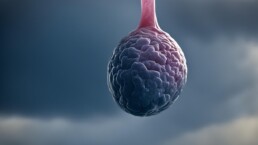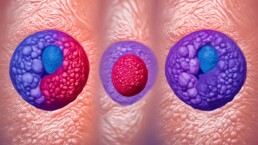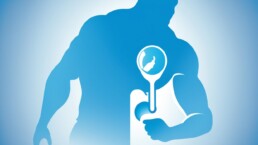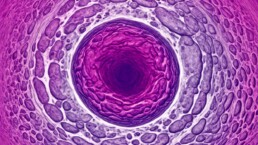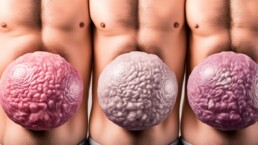Medically reviewed by Dr Chandril Chugh,
Renowned Neurologist and American Trained Specialist
If you’re concerned about your health, it’s crucial to be aware of the first signs of testicular cancer and the importance of early detection. Testicular cancer is a type of cancer that starts in the testicles, which are part of the male reproductive system. Detecting testicular cancer early can significantly improve treatment outcomes and increase the chances of a full recovery.
Table of Contents
ToggleThe first signs of testicular cancer may include an enlarged testicle, a small lump, or an area of hardness. Other symptoms can include pain, discomfort, or numbness in the testicle or scrotum, a change in the way the testicle feels, a feeling of heaviness in the scrotum, a dull ache in the lower abdomen or groin, and a sudden buildup of fluid in the scrotum. While these symptoms can indicate the presence of testicular cancer, it’s important to note that not all men with testicular cancer will experience them, and having these symptoms does not necessarily mean that you have cancer.
If you notice any changes or abnormalities in your testicles, it’s essential to consult a doctor as soon as possible. Early intervention and diagnosis play a vital role in successful treatment. Don’t ignore potential signs or delay seeking medical attention. Taking action promptly can make a significant difference in your health and well-being.
Key Takeaways:
- Be aware of the first signs of testicular cancer to enable early detection.
- Common symptoms include an enlarged testicle, a small lump, or an area of hardness.
- Other symptoms may include pain, discomfort, or numbness in the testicle or scrotum.
- Consult a doctor if you notice any changes or abnormalities in your testicles.
- Early intervention and diagnosis are crucial for successful treatment.
Understanding Testicular Cancer
Testicular cancer is a type of cancer that affects the testicles, which are an important part of the male reproductive system. The testicles, also known as testes, are responsible for producing sperm and the hormone testosterone. When testicular cancer occurs, abnormal cells grow in the testicles, leading to the formation of tumors.
Testicular cancer primarily affects young adult men between the ages of 15 and 45. It is one of the most common types of cancer in this age group. Detecting testicular cancer early is crucial for successful treatment and improved outcomes. Being aware of the risk factors, signs, and symptoms can help in the early detection of this disease.
Risk Factors for Testicular Cancer
Several factors may increase the risk of developing testicular cancer:
- Having an undescended testicle: Men who had a testicle that didn’t descend into the scrotum at birth or had surgery to correct it are at an increased risk.
- Family history: Having a family history of testicular cancer, particularly in a father or brother, increases the risk.
- Age: Testicular cancer is most commonly diagnosed in young adult men.
- Ethnicity: White men have a higher risk of developing testicular cancer compared to men of other ethnic backgrounds.
Signs and Symptoms of Testicular Cancer
Understanding the signs and symptoms of testicular cancer is essential for early detection and timely medical intervention. Some common signs and symptoms to watch out for include:
- A lump or swelling in one or both testicles
- A feeling of heaviness in the scrotum
- A dull ache or pain in the lower abdomen or groin
- Sudden swelling or lumps in the scrotum
- Pain or discomfort in a testicle or the scrotum
- Enlargement or tenderness of breast tissue
- Back pain
If you experience any of these symptoms or notice any changes in your testicles, it’s essential to consult a healthcare professional for further evaluation and diagnosis.
| Testicular Cancer Risk Factors | Increased Risk |
|---|---|
| Undescended testicle | Yes |
| Family history of testicular cancer | Yes |
| Age | 15-45 years |
| Ethnicity | White |
It’s important to note that these risk factors don’t guarantee the development of testicular cancer. Conversely, not having any specific risk factors doesn’t exempt individuals from the possibility of developing this disease. Regular self-exams, routine check-ups with a healthcare provider, and staying vigilant to any changes can contribute to early detection and timely treatment.

Next, we will explore the diagnostic process for testicular cancer and the various tests that may be conducted to confirm the diagnosis.
Diagnosing Testicular Cancer
If you suspect testicular cancer, a medical evaluation is necessary to confirm the diagnosis. This evaluation involves several diagnostic procedures, including physical examination, blood tests, imaging tests, and in some cases, a biopsy of the testicle.
During the physical examination, your doctor will carefully examine your testicles and scrotum for any lumps, swelling, or other abnormalities. They may also check for pain or tenderness in the area. This initial examination helps to assess the presence of any visible signs or symptoms related to testicular cancer.
To further evaluate your condition, blood tests may be conducted. These tests measure the levels of specific markers that can indicate the presence of testicular cancer. Elevated levels of these markers can provide valuable information for the diagnosis and staging of the disease.
In addition to blood tests, imaging tests may be performed to assess the extent of the cancer and to determine if it has spread to other parts of the body. Common imaging techniques used to diagnose testicular cancer include ultrasound and CT scan. These tests provide detailed images of the testicles and surrounding tissues, allowing doctors to identify any tumors or abnormalities.
In some cases, a biopsy may be required to obtain a small sample of tissue from the testicle for further analysis. This procedure helps to confirm the presence of cancer cells and provides important information about the type and stage of the cancer.
Diagnosing Testicular Cancer – Summary:
To diagnose testicular cancer, a medical evaluation is necessary, which includes:
- Physical examination to check for lumps, swelling, or other abnormalities
- Blood tests to evaluate specific markers indicating testicular cancer
- Imaging tests (ultrasound or CT scan) to assess the extent and spread of the cancer
- Biopsy to obtain a tissue sample for further analysis
These diagnostic procedures help confirm the presence of testicular cancer, determine the stage of the disease, and guide treatment planning.
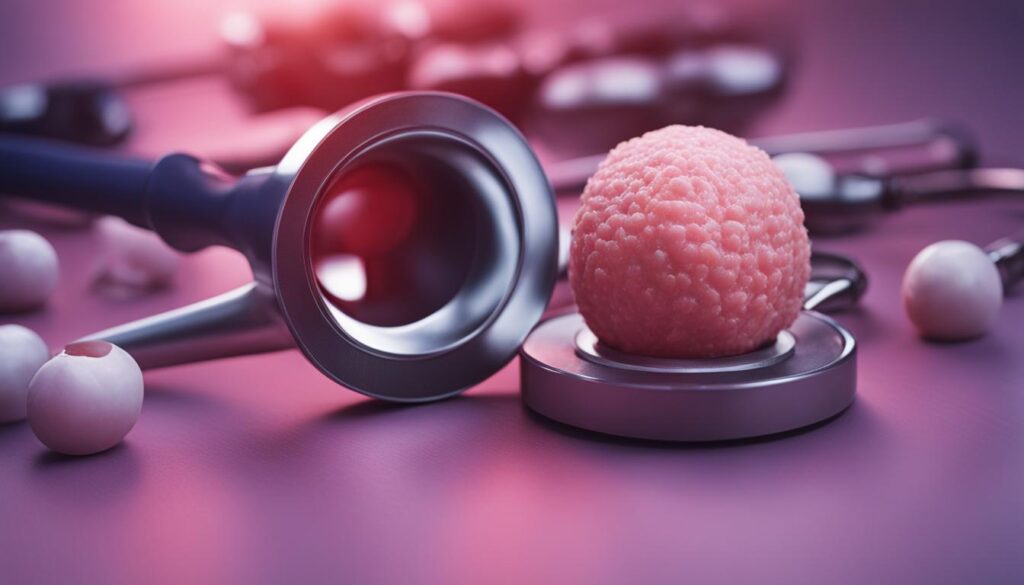
Treatment Options for Testicular Cancer
When it comes to testicular cancer, there are various treatment options available depending on the type and stage of the cancer. These options include surgery, chemotherapy, radiation therapy, and surveillance. Let’s take a closer look at each of these treatment methods:
Surgery
Surgery is often the primary treatment for testicular cancer. It typically involves the removal of the affected testicle, a procedure known as orchiectomy. In some cases, additional surgery may be necessary to remove nearby lymph nodes or address complications. The goal of surgery is to remove the cancerous cells from the body and prevent the cancer from spreading.
Chemotherapy
Chemotherapy is a treatment option that uses drugs to kill cancer cells. It is often recommended when the cancer has spread beyond the testicles to other parts of the body. The drugs are administered either orally or intravenously and can target cancer cells throughout the body. Chemotherapy may be used before or after surgery to ensure the complete eradication of cancer cells.
Radiation Therapy
Radiation therapy involves the use of high-energy X-rays to target and destroy cancer cells. It is typically used when the cancer has spread to specific areas of the body. The radiation is carefully directed towards the affected area to minimize damage to healthy tissues. Radiation therapy may be administered after surgery or in combination with chemotherapy to maximize treatment effectiveness.
Surveillance
Surveillance, also known as active monitoring, may be an option for individuals with early-stage, low-risk testicular cancers. Instead of undergoing immediate treatment, regular check-ups and imaging tests are conducted to monitor any changes or progression of the cancer. This approach is recommended when the cancer is slow-growing and unlikely to spread. In case of any significant changes, active treatment options can be explored.
It’s important to consult a healthcare professional to discuss the most appropriate treatment option based on individual circumstances. The choice of treatment will depend on factors such as the stage of the cancer, overall health, and personal preferences.
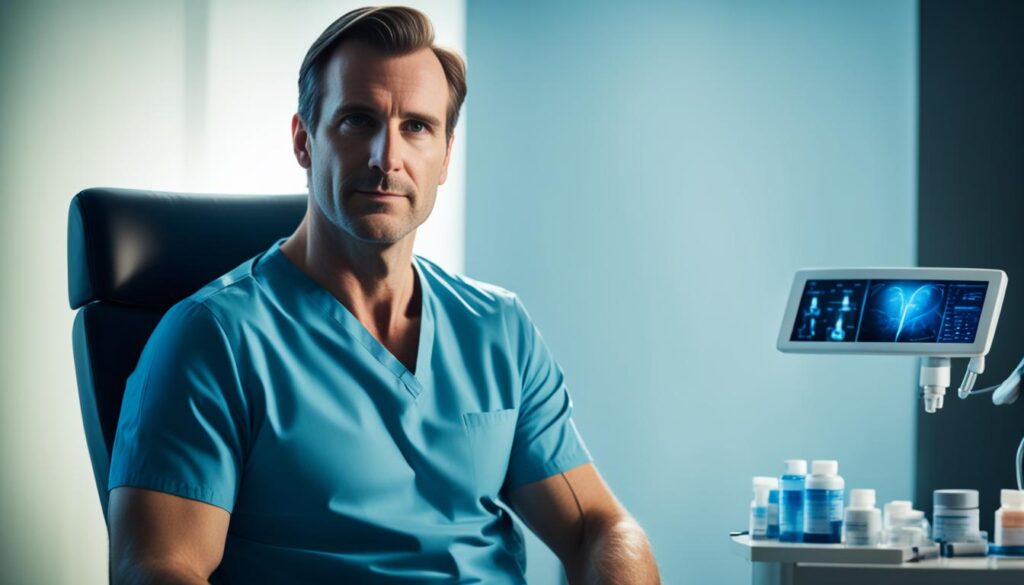
| Treatment Option | Description |
|---|---|
| Surgery | Removal of the affected testicle (orchiectomy) or additional surgery to address complications or remove nearby lymph nodes. |
| Chemotherapy | Use of drugs to kill cancer cells that have spread beyond the testicles. |
| Radiation Therapy | Use of high-energy X-rays to target and destroy cancer cells in specific areas. |
| Surveillance | Close monitoring of early-stage, low-risk cancers to assess any changes over time. |
Living with Testicular Cancer
Receiving a diagnosis of testicular cancer can be overwhelming and bring forth a range of emotions. However, it is important to remember that you are not alone in this journey. There are various resources and support systems available to help you cope with the condition.
In order to effectively manage testicular cancer, it is crucial to work closely with a healthcare team. Your healthcare professionals will collaborate with you to develop a personalized treatment plan that suits your specific needs and address any concerns or questions you may have.
Support groups and counseling services play a vital role in providing emotional support by connecting you with individuals who may be going through similar experiences. Additionally, online communities and forums can serve as spaces to share your thoughts, concerns, and experiences with others who understand what you’re going through. Note: Remember to practice caution and verify the credibility of online platforms before sharing personal information.
To maintain overall well-being during and after treatment, it is important to prioritize your physical and emotional health. Engage in regular exercise, as recommended by your healthcare team, to improve strength and endurance. Adopting a balanced diet that includes a variety of nutritious foods can also support your body’s healing process and boost your overall health.
Remember, every individual’s journey with testicular cancer is unique. It is perfectly okay to reach out for support and lean on others for help when needed. Living with testicular cancer does not have to be an isolating experience — there are resources available to help you navigate this journey with confidence and resilience.
Support and Resources for Testicular Cancer:
- Testicular Cancer Foundation – Provides information, support, and resources for individuals and families affected by testicular cancer. Visit their website: Testicular Cancer Foundation.
- Cancer Support Community – Offers support groups, educational programs, and counseling services for individuals affected by cancer. Explore their services: Cancer Support Community.
- American Cancer Society – Provides information on testicular cancer, treatment options, and support programs. Access their resources: American Cancer Society.

Testicular Cancer Awareness and Prevention
Testicular cancer awareness plays a crucial role in early detection and improved treatment outcomes. By being aware of the signs and symptoms of testicular cancer, you can take proactive measures to identify any abnormalities or changes in your testicles. Regular self-exams are encouraged as a means to become familiar with the usual feel of your testicles, making it easier to detect any potential issues.
However, it’s important to note that not all healthcare providers agree on the effectiveness of self-exams in reducing the risk of testicular cancer. While self-exams can be valuable for early detection, they should not replace regular check-ups with a healthcare provider.
Prevention measures for testicular cancer are not well-established. Nevertheless, maintaining overall health and following a healthy lifestyle may contribute to reducing the risk. Factors such as regular exercise, a balanced diet, and avoiding tobacco and excessive alcohol use can positively impact overall well-being and potentially reduce the risk of developing testicular cancer.
When it comes to testicular cancer, early detection and proactive measures are key. Regular check-ups with a healthcare provider are essential, particularly for individuals with a family history of testicular cancer or other risk factors. Your healthcare provider can provide personalized guidance and support, as well as conduct necessary screenings and tests.
Prevention Tips:
- Maintain a healthy lifestyle with regular exercise and a balanced diet.
- Avoid tobacco and excessive alcohol use.
- Discuss any concerns or family history of testicular cancer with your healthcare provider.
- Attend regular check-ups and screenings to monitor your health.
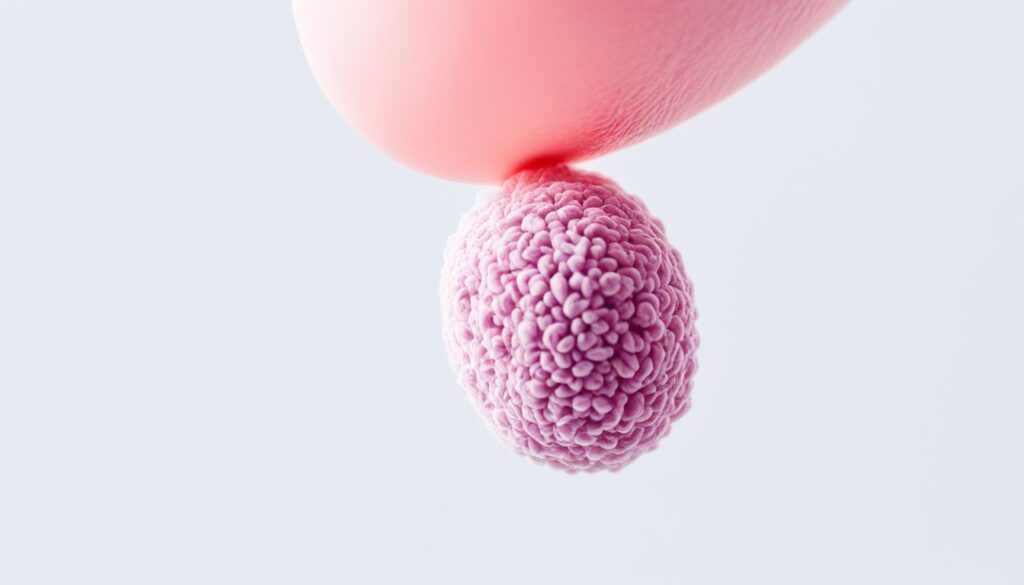
Testicular Cancer Research and Advances
Ongoing research and clinical trials play a crucial role in advancing our understanding of testicular cancer and improving treatment options for affected individuals. Scientists and healthcare professionals are constantly exploring new approaches, such as targeted therapies and immunotherapies, to enhance outcomes in testicular cancer patients.
One significant avenue of progress in testicular cancer research is the development of targeted therapies. These treatments aim to identify and attack specific molecules or pathways involved in cancer growth, minimizing damage to normal cells. By targeting the underlying mechanisms of testicular cancer, these therapies offer the potential for more effective and tailored treatment regimens.
Immunotherapies have also emerged as a promising area of investigation in testicular cancer research. These therapies harness the body’s immune system to detect and destroy cancer cells. By boosting the immune response against testicular cancer, immunotherapies have the potential to enhance the body’s natural defenses and improve treatment outcomes.
“The advancements in targeted therapies and immunotherapies hold great promise for individuals with testicular cancer. These innovative approaches offer new avenues for personalized treatments and improved outcomes,”
Clinical trials provide opportunities for patients to access experimental treatments and contribute to the advancement of medical knowledge. Participating in a clinical trial allows individuals to receive cutting-edge therapies not yet available to the general public. Furthermore, the data and insights gained from clinical trials help researchers refine treatment protocols and develop better strategies for combating testicular cancer.
New Treatment Approaches in Testicular Cancer Research
Scientists and researchers are continually exploring novel treatment approaches to enhance outcomes in testicular cancer. Some of the recent developments include:
- Targeted Therapies: These treatments aim to specifically block the growth signals of cancer cells, minimizing the impact on healthy tissues.
- Immunotherapies: By stimulating the body’s immune system, immunotherapies help recognize and eliminate testicular cancer cells more effectively.
- Combination Therapies: Researchers are investigating the use of multiple treatment modalities to maximize effectiveness and improve long-term outcomes.
- Precision Medicine: Tailored treatment plans based on a patient’s specific cancer characteristics, helping to deliver more personalized care.
These advances in testicular cancer research offer hope for improved outcomes and quality of life for individuals living with the disease. As researchers continue to make progress, patients can look forward to more effective and targeted treatment options in the future.
Testicular Cancer Awareness Month
Testicular Cancer Awareness Month is an annual campaign held in April to raise awareness about testicular cancer and promote education and support for individuals affected by the disease. During this month, various organizations and healthcare institutions conduct awareness campaigns, informational sessions, and fundraising events to spread the word about the importance of early detection, available treatment options, and support resources.
“Raising awareness about testicular cancer is crucial to ensuring that individuals are equipped with the knowledge and resources to detect the disease early, seek prompt medical attention, and access necessary support.”
It’s an opportunity for communities to come together to show support for individuals with testicular cancer and their families, as well as to raise funds for research and advocacy efforts. By increasing awareness, Testicular Cancer Awareness Month aims to reduce stigma, improve understanding, and encourage proactive measures for prevention, detection, and treatment.
| Importance of Testicular Cancer Awareness Month | Benefits |
|---|---|
| Raising Awareness | Increases knowledge and understanding of testicular cancer among the general public |
| Promoting Education | Empowers individuals with information on early detection, symptoms, and available resources |
| Support and Advocacy | Connects individuals affected by testicular cancer with support networks and advocacy organizations |
| Fundraising | Raises funds for research, treatment advancements, and patient support initiatives |
Participating in Testicular Cancer Awareness Month activities can make a significant impact on the lives of individuals diagnosed with the disease. By spreading awareness, advocating for education, and providing support, we can work towards a future where testicular cancer is detected early, treated effectively, and better understood by society.
Conclusion
Early detection is crucial for successful treatment and improved outcomes in testicular cancer. By understanding the first signs and symptoms of testicular cancer, you can take action and seek medical attention if any abnormalities or changes are noticed in your testicles or scrotum. Regular check-ups, self-exams, and open communication with your healthcare providers are essential for maintaining optimal health and detecting any potential issues at an early stage.
It is important to prioritize your health and make it a priority. By staying informed about testicular cancer and its symptoms, you can take charge of your well-being and ensure timely intervention if needed. Remember that not all men with testicular cancer will experience symptoms, so regular check-ups and self-exams are crucial for early detection. Taking action and seeking medical attention promptly can significantly improve the chances of successful treatment and recovery.
Remember, your health is valuable, and prioritizing it is essential. Don’t hesitate to reach out to your healthcare provider if you have any concerns or notice any changes in your testicles or scrotum. By taking proactive measures and staying informed about testicular cancer, you can play an active role in safeguarding your health and well-being.
FAQ
What are the first signs of testicular cancer?
The first signs of testicular cancer are usually an enlarged testicle, a small lump, or an area of hardness. Other symptoms may include pain, discomfort, or numbness in the testicle or scrotum, a change in the way the testicle feels, a feeling of heaviness in the scrotum, a dull ache in the lower abdomen or groin, and a sudden buildup of fluid in the scrotum.
What is testicular cancer?
Testicular cancer is a type of cancer that starts in the testicles, which are part of the male reproductive system. The testicles produce sperm and the hormone testosterone. Testicular cancer is most commonly diagnosed in young adult men, typically between the ages of 15 and 45.
How is testicular cancer diagnosed?
If testicular cancer is suspected, a medical evaluation will be conducted to confirm the diagnosis. The evaluation may include a physical examination, blood tests, imaging tests such as ultrasound or CT scan, and a biopsy of the testicle.
What are the treatment options for testicular cancer?
The treatment options for testicular cancer depend on several factors, including the type and stage of the cancer. The main treatment options include surgery, chemotherapy, radiation therapy, and surveillance.
How can individuals cope with testicular cancer?
A diagnosis of testicular cancer can be overwhelming, but there are resources and support available to help individuals cope with the condition. It’s important to work closely with a healthcare team to develop a personalized treatment plan and address any concerns or questions. Support groups, counseling services, and online communities can also provide emotional support and a sense of community for individuals with testicular cancer.
How can testicular cancer be detected early?
Testicular cancer awareness is crucial for early detection and improved treatment outcomes. Self-exams can be performed regularly to help individuals become familiar with the usual feel of their testicles, making it easier to detect any changes or abnormalities. Regular check-ups with a healthcare provider are also recommended, especially for individuals with a family history of testicular cancer or other risk factors.
What advances are being made in testicular cancer research?
Ongoing research and clinical trials are essential for advancing the understanding and treatment of testicular cancer. Scientists and healthcare professionals are continuously exploring new treatment options, such as targeted therapies and immunotherapies, to improve outcomes for individuals with testicular cancer.
What is Testicular Cancer Awareness Month?
Testicular Cancer Awareness Month is an annual campaign held in April to raise awareness about testicular cancer and promote education and support for individuals affected by the disease. During this month, various organizations and healthcare institutions conduct awareness campaigns, informational sessions, and fundraising events to spread the word about the importance of early detection, available treatment options, and support resources.
What should I do if I suspect testicular cancer?
Early detection is crucial for successful treatment and improved outcomes in testicular cancer. Understanding the first signs and symptoms of testicular cancer can empower individuals to take action and seek medical attention if any abnormalities or changes are noticed in the testicles or scrotum. Regular check-ups, self-exams, and open communication with healthcare providers are key in maintaining optimal health and detecting any potential issues at an early stage.
Source Links

This article is medically reviewed by Dr. Chandril Chugh, Board-Certified Neurologist, providing expert insights and reliable health information.
Dr. Chandril Chugh is a U.S.-trained neurologist with over a decade of experience. Known for his compassionate care, he specializes in treating neurological conditions such as migraines, epilepsy, and Parkinson’s disease. Dr. Chugh is highly regarded for his patient-centered approach and dedication to providing personalized care.

